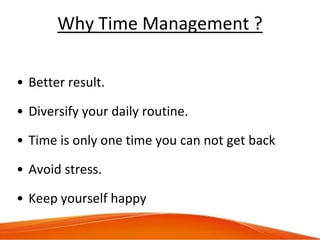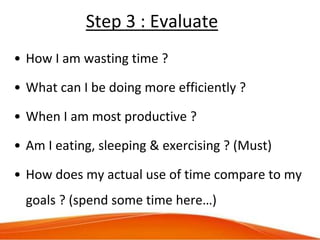Time & Stress Management Presentation
- 1. “Time & Stress Management”
- 2. Objective • Improved focus & attention • Increase comprehension • Improved problem solving abilities • Improved test scores & academic performance • Improved your health & social life. • Improved learning abilities & more…
- 3. Inspirational Thoughts • “If you want to make your dreams come true, the first thing you have to do is wake up” • “If you don't know where you are going, you will probably end up somewhere else” • “To get what you want, stop doing what isn’t work”
- 4. What is Stress ? • Stress is short of tension or pressure • Stress is your body's way of responding to any kind of demand. • It can be caused by both good and bad experiences. • Stress is form of pain, a messenger that comes form inside, which tells you that there is something you need to change.
- 6. Work – Related Stressors • Being unhappy in your job • Working long hours • Having a heavy workload or too much responsibility • Working in dangerous conditions • Insecurity about advancement or risk of termination • Having to give speeches in front of colleagues • Facing discrimination or harassment
- 8. Impact of Stress • 70-80% of outpatient visits may be related to stress • Linked to all leading physical causes of death - heart disease, cancer, stroke etc. • Associated with development of most major mental health problems – depression.
- 9. How to Reduce Stress ? • Follow the time management chart. • Daily 40 minutes exercise, meditation and yoga • 7 hours sleep daily • Proper healthy diet • Better concentration/focus • More stable moods • Focus on hobbies.
- 10. Why Time Management ? • Better result. • Diversify your daily routine. • Time is only one time you can not get back • Avoid stress. • Keep yourself happy
- 11. Bed Time Management = STRESS
- 12. Good Time Management = HAPPINESS and time for PLAY
- 13. Time Management Chart TIME MON TUE WED THU FRI SAT SUN 6:00 AM Meditation Meditation Meditation Meditation Meditation Meditation 7:00 AM School / College School / College School / College School / College School / College School / College 8:00 AM School / College School / College School / College School / College School / College School / College 9:00 AM School / College School / College School / College School / College School / College School / College 10:00 AM School / College School / College School / College School / College School / College School / College 11:00 AM School / College School / College School / College School / College School / College School / College 12:00 AM School / College School / College School / College School / College School / College School / College 1:00 PM School / College School / College School / College School / College School / College School / College 2:00 PM Home Home Home Home Home Home 3:00 PM 4:00 PM 5:00 PM 6:00 PM 7:00 PM 8:00 PM 9:00 PM 10:00 PM 11:00 PM School / College 3-4 pm less productive time- you can take short nap, social time, use internet, reading- news paper (what ever you like) Sports / Dance classes / hobbies etc. Study- 2 hrs - Fresh / New topic study & 2 hrs - Revision / home work (Productive time) 11-6 am - Sleep time Sunday Revision, New Topic / Assignment / Pending work / Social time / Entertainment / Sports / Hobbies / Picnic / Market & Preparation for tomorrow / coming week.
- 14. Step 1 : Set Goals & Plans • What do you really want ? • Goal for life, next 5 years, this year, this semester, this week, today • Write them down and look at them periodically • Failing to plan is planning to fail • You can always change your plans later but only if you HAVE them !
- 15. Step 2 : Determine How You Spend Time • Note down your daily routine • Update every half hour (not end of the day)
- 16. Step 3 : Evaluate • How I am wasting time ? • What can I be doing more efficiently ? • When I am most productive ? • Am I eating, sleeping & exercising ? (Must) • How does my actual use of time compare to my goals ? (spend some time here…)
- 17. Step 4 : Schedules & Lists • Make a schedule- Include classes, work, exercise, sports, social time, mealtime, sleep. • Figure out your prime productivity time & try to schedule difficult task for time when you are most alert.
- 18. Step 5 : To Do List • Break down big tasks into small ones • Do easy thing first • Prioritize using due dates and importance
- 19. Time Matrix
- 22. Glimpses of Time & Stress Management Workshop
- 23. Glimpses of Time & Stress Management Workshop
- 24. Glimpses of Time & Stress Management Workshop
- 25. Thanks & Regards, Vivek Shivhare Dy. Manager- Marketing Amity Educational Group Mob. - 08959597978 www.amity.edu, www.agbs.in
























